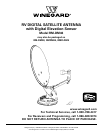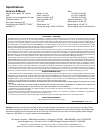
1 2
STEP 1. The more accurately you determine North, the easier it is to locate the satellite. Step outside and away
from your vehicle. (Standing too near to your vehicle can give incorrect compass readings.) It is helpful if there is
a landmark on the horizon to represent North. Return to the vehicle and point the directional dial North or to the
landmark.
300
310
320
330
340
350
50
20
30
40
POINT NORTH
290
10
60
70
240
250
Tuning Antenna
STEP 1. Your receiver should indicate it is receiving a signal. To tune your antenna for the best signal strength,
slowly move the antenna left, then right, until you have found the position that gives the highest signal strength. It is
important to turn the antenna slowly. Because the signal is digital, the receiver takes a few seconds to lock on.
STEP 2. Place rotation clamp in the LOCK position. This prevents antenna movement and loss of signal.
STEP 3. Slowly raise then lower the antenna until you have peaked the signal. You are now ready to watch satellite TV!
Lowering Antenna to Travel Position
STEP 1. Set the rotation clamp to ROTATE position.
STEP 2. Rotate antenna until pointer on directional handle aligns with the red screw on the rotation clamp.
STEP 3. Turn elevating crank counterclockwise in direction of DOWN arrow until meeting resistance. The number of
turns will vary according to the elevation angle the antenna was set at.
STEP 4. Move rotation clamp to the LOCK position. Antenna is now locked in travel position.
STEP 5. Snap elevation crank in place.
CAUTION! NEVER LOWER ANTENNA IN ANY POSITION EXCEPT TRAVEL POSITION!
DOs
1. Do check parking location for obstructions before raising antenna.
2. Do carefully raise, lower and rotate antenna. If difficult, check for cause.
3. Do rotate slowly when searching for the satellite(s), and check fine tuning on TV set to make sure it is properly
adjusted.
4. Do lower antenna before moving vehicle!
5. Do activate programming by calling program provider for your receiver.
DON’Ts
1. Don’t move RV/coach with the antenna in the UP position. This will void your warranty and may also cause
damage to your roof.
2. Don’t force elevating crank up or down. Check for cause of trouble.
3. Don’t rotate directional handle hard against stops.
4. Don’t apply paint over top of base plate or anywhere on lift.
5. Don’t apply sealant on gear housing.
Directional Handle
Red screw
Elevating Crank
(unsnap to pull handle down)
Directional Handle Pointer
Directional Dial
Rotation Clamp
Figure 1
STEP 2. Turn on receiver and television. Tune the television to channel 3 or 4. Using your receiver manual for
instructions, go to the Signal Meter screen. Enter nearest zip code for your location using receiver’s remote control.
After the zip code is entered, the receiver will indicate numbers for azimuth (compass heading) and elevation.
Unsnap the elevating crank, and turn the elevation handle CLOCKWISE to raise the antenna. Turn the elevating crank
COUNTERCLOCKWISE to lower the antenna.
STEP 3. Press the button on the Winegard digital display wall plate. If antenna is in travel position, the display will
show LL for Low Limit. HL for High Limit will appear when the dish is in up position.
STEP 4. Crank the elevation handle to raise antenna. Stop cranking when the readout displays the correct elevation
for your location, which is found on the receiver’s signal meter screen.
STEP 5. Rotate antenna slowly until the correct satellite signal is acquired. NOTE: Rotate 3°, then stop. DO NOT rotate
continuously, even if you are rotating slowly. If you notice the elevation angle has changed, it could be due to the
following reasons:
1. RV is not parked level.
2. Antenna is mounted to a slightly sloped RV roof. (This is not a problem.)
When you have rotated the antenna so it is facing in approximately the right azimuth (compass direction), simply
adjust to correct elevation, and continue searching for signal.
When you have detected the satellite signal, adjust the antenna up/down and left/right for the strongest signal the
receiver displays. Due to variations in receivers and installation methods, you may find the elevation numbers (after
peaking on the strongest signal) no longer match what the receiver recommended. This is normal. The elevation
sensor should always get you close enough to pick up a signal to peak on. If the display turns off while you’re
searching, just push the button for another minute of operation. After a little practice, finding the signal may only take
30 to 50 seconds.
Replacement Parts
For replacement parts, contact Winegard Company at 1-800-288-8094 (credit card orders only, $5.00 minimum order).
To order receivers or programming, please call the Winegard receiver hotline at 1-866-609-9374.
Operation













